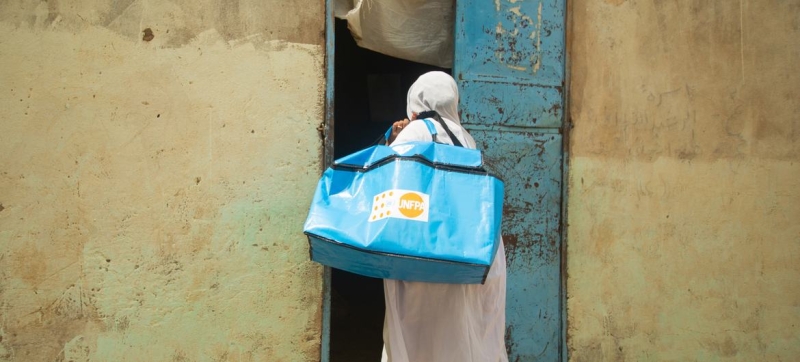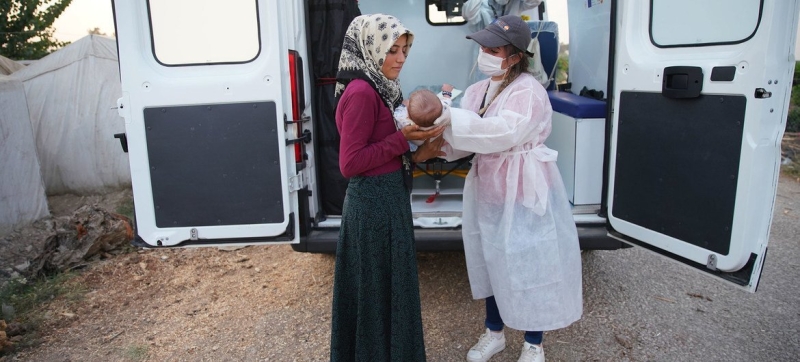
Preventable maternal deaths fell by a third, as did the birth rate among girls aged 15 to 19. More than a line in a table: why every inhabitant of the planet should be counted Sustainable Development Goals
All people in the world—8 billion people already—have the right to be counted. Yet millions of the planet’s most vulnerable people remain lost in or excluded from the masses.
The reasons for this phenomenon may be financial restrictions or the difficult terrain in which people live. But these problems can always – and should – find a solution.
“The vibrant fabric of humanity is only as strong as its weakest thread,” said the Executive Director of the United Nations Population Fund (UNFPA) Natalia Kanem
Ahead of World Population Day on July 11, UNFPA is sharing four facts about why it is important that data collection processes include all people and the diversity of humanity.
1. Information is power. It helps us understand problems and their solutions
30 years have passed since the historic International Conference on Population and Development, where world leaders declared that inclusive and sustainable development is impossible without priority to human rights, including reproductive rights. Over the years, the world has become a safer and more equal place for women and girls: preventable maternal deaths have fallen by a third, as has the birth rate among girls aged 15 to 19.
Improving data collection and analysis methods is critical to understanding how far the world has come in terms of sexual and reproductive health and rights for all. At the same time, generally positive trends can overshadow what still requires effort.
Read also:
UN: 800 women die every day in childbirth
Disaggregated data—data broken down by categories such as gender, disability status, race, ethnicity, and others—can show that experts get very different results for women in different populations. For example, a 2023 UNFPA analysis found that, due in part to health care discrimination, women and girls of African descent in the Americas face an increased risk of death during pregnancy.
Only by understanding such factors can one begin to work for positive change. However, only four of the nine countries included in the analysis collect globally comparable data on maternal mortality by race.
Around the world, those who most vulnerable are still not sufficiently included in data collection. “The consequences of this deeply affect their lives and well-being,” Kanem said. “Recent UNFPA research shows acute and growing inequality both within and between countries.”
2. Governments need data to make decisions
Where to build a new maternity ward? How many women in the region want, but cannot, use modern contraception? To answer these questions , research is needed – in compliance with ethical standards and with the participation of the population.

Midwife in a shelter for displaced people.
For example, in Cambodia, the maternal mortality rate has dropped by almost two-thirds since 2000. Based on evidence of the important role of midwives in preventing deaths, the government has invested in training and expanding the midwifery workforce. According to the UNFPA State of the World’s Midwifery 2021 report, the number of midwives working in obstetric units nearly doubled between 2010 and 2019.
3. Inclusive data shows who was left behind
Globally, it is estimated that 15 percent of the population experiences disability and the associated rights violations and marginalization. According to the UNFPA World Population 2024 report, women with disabilities may be 10 times more vulnerable to gender-based violence.
Read also :
Women with disabilities in Turkmenistan defend their rights
People with disabilities often find themselves left out of progress. Developing targeted interventions to help specific communities requires understanding the challenges they face. In other words, this process requires data.
Fortunately, many countries are updating their information collection methods to be more inclusive. For example, according to UNFPA, the proportion of countries asking the public standardized questions about their experiences with disabilities has more than doubled since 2018.
4. Ethical and inclusive data collection holds governments accountable
Data collection can involve sensitive issues. When information is collected on a country’s ethnicity, sexual orientation and other sensitive topics, this leads to risks of human rights violations. However, it is unlikely that problems associated with data misuse can be solved without collecting it at all.

UNFPA mobile team helps refugees.
Solving such problems requires the efforts of civil society and non-governmental organizations, as well as local experts and vulnerable groups of the population themselves. They know best how to keep people safe and respectful, so they should be involved in the collection and use of official data. Communities should also be allowed and encouraged to collect and publish their own data, as stigma and fear often cause people to withhold important information from the government. Additionally, training can help data collectors conduct research with understanding and respect.
Politicians often ignore social problems as if they do not exist. After all, there is no reason to provide funding for LGBTQIA+ health programs if the country does not have LGBTQIA+ members in its population. Data makes it extremely difficult to gloss over problems. It also empowers communities to hold leaders accountable.
In the face of growing inequality and crises, governments must commit to collecting and using data to help those left behind ” UNFPA works around the world to support this mission.
